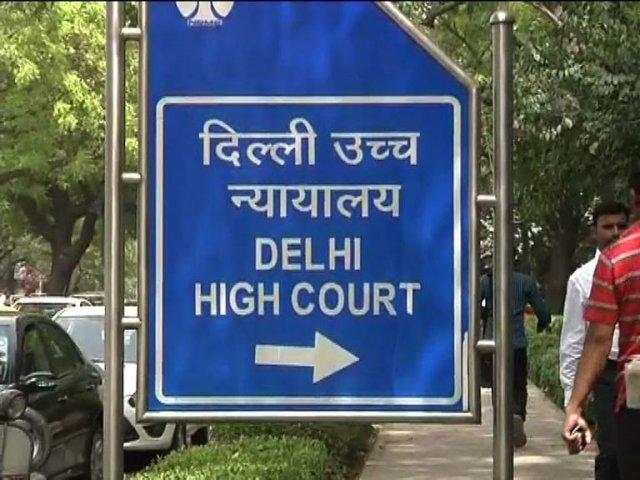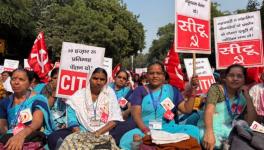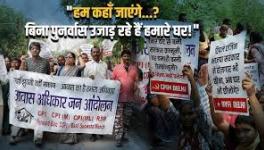Delhi High Court Nullifies Wage Hike on Technicalities

On 4 August 2018, a two-judge bench of the Delhi High Court struck down a Delhi govt. notification last year, hiking minimum wages of workers by 37%. Besides the merits and demerits of the judgement itself, this event marks a decisive blow to the struggle of Delhi’s workers to achieve some level of just and dignified wage. Conversely, it marks the judicial acceptance of an exploitative regime imposed by industrialists and owners on the Capital city’s hapless working class. It is ironic that the judgement was delivered just days after a strike by Delhi’s workers for effective implementation of the minimum wages.
The Delhi govt. had hiked statutory minimum wages for 29 types of work in March 2017. The hike was substantial – from Rs.9745 to Rs.13,350 per month for unskilled workers, and similarly for semi-skilled and skilled workers, pro rata.
This was preceded by recommendations given by an Advisory Committee set up as prescribed by the Minimum Wages Act, which included five members each from the employers’ and employees’ sides and three govt. officials to act as ‘independent’ members.
The hike in wages, though substantial, still falls well short of the minimum wages given to central govt. employees by the Seventh Central Pay Commission (CPC) which amount to Rs.18,000 per month. Strangely, both the Delhi govt. and the CPC claim to arrive at their wage level from the same source of computation, the 1957 Indian Labour Conference recommendations, as approved and further added upon by the Supreme Court’s judgement of 1991. But that’s a different story.
Also Read: Delhi: Over 2 Million Workers to Strike on 20 July
In the Delhi case, the judgement of the High Court makes for a bizarre reading. Quoting extensively from previous cases it correctly points out that courts should not intervene in minimum wage fixation orders unless there is “the most substantial grounds”. It stresses that the Minimum Wages Act, 1948, is “clearly to prevent exploitation of labour” and dismisses as irrelevant the argument of petitioners (who are a clutch of various types of employers) that the burden of minimum wages or its upward revision will cause hardship or that they will be unable to meet such burden. It reasserts the constitutional validity of the Act and also reasserts that minimum wages should not just be “subsistence wages”. It even reiterates earlier judgements which held that some defects in composition of the advisory committee or its proceedings should not normally stand in the way of the final decision taken by the govt. which is not bound by such recommendations.
Then, the judgement takes a completely different tack by saying that the employers and employees were not properly represented in the advisory committee, that its advice though not binding, needs to be considered with open mind, and that the govt. appeared to have shown a prejudice towards both employers and employees. It says that the constitution of the advisory committee was completely flawed, it did not give hearing to either employees or employers, it did not take into account various facts, etc. It held that the process of fixation thus violated the principles of natural justice.
Calling all this “substantial ground” for intervention, the High Court declared the notification as unconstitutional because it violated not only the Minimum Wages Act but also Article 14 (right to equality) of the Indian Constitution!
In other words, it side-stepped the issue of the Act’s mandate to protect workers from exploitation, refused to adopt the ‘beneficial construction’ approach, went into technicalities that precedent would not sanction and thus struck down the notification. Although the judgement repeatedly criticised the Delhi govt.’s mission to increase the wages, it appears to have adopted a counter-mission to overturn the wage hike notification.
The single most important issue – whether the new minimum wages are justified on the basis of computations based on well-accepted standards – was not addressed by the judgement at all because it considered only irrelevant factors like who was involved in coming to this conclusion and whether everybody got equal opportunity to have their say.
Trade unions in Delhi have expressed deep disappointment at the judgement. Anurag Saxena of the CITU, and a member of the Advisory Committee that recommended the hiked wage levels, said in a statement that the ruling was “disappointing and condemnable”.
“Five representatives of the owners were part of the minimum wages advisory committee and they got full opportunity to put forth their views,” Saxena said.
Also Read: Indian Workers on Starvation Wage
Minimum wages were last revised in Delhi in 2011. Besides this periodic revision, a system of six-monthly increase in dearness allowance is in place. But this essentially takes care of rise in food prices. The increase in prices of fuel/transport, house rent, education, healthcare etc. is not compensated in dearness allowance increases. Hence revision of basic minimum wage rates is important and provided for in the laws.
The trend of judicial intervention in holding back minimum wage increases has now become a widely available recourse for employers in various states. In neighbouring UP, a similar case has held up wages in the engineering industry for many years. This forms part of the increasing subservience of judicial wisdom to the neo-liberal frame of thought which seeks to remove legislative protection of workers. Weakening of labour laws and the hollowing out of labour law enforcement machinery in states are the other more manifest prongs of this attack on the working class.
Get the latest reports & analysis with people's perspective on Protests, movements & deep analytical videos, discussions of the current affairs in your Telegram app. Subscribe to NewsClick's Telegram channel & get Real-Time updates on stories, as they get published on our website.
























